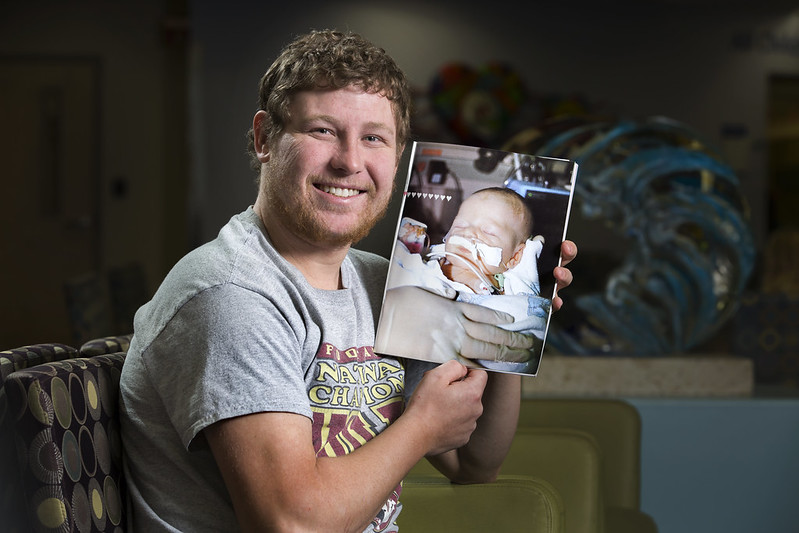For Ny’Jour – 200 is his Lucky Number
James Quintessenza, M.D., will always remember the first heart transplant surgery at All Children's Hospital in 1995. Fast forward to 2024 and meet Ny'Jour, Johns Hopkins All Children's 200th heart transplant patient.

James Quintessenza, M.D., will always remember the first heart transplant surgery at All Children’s Hospital in 1995.
The co-director of the Johns Hopkins All Children’s Heart Institute and chief of cardiovascular surgery was one of the cardiothoracic surgeons who performed the transplant.
“The surgery took place at old All Children’s Hospital on Sixth Street South,” he says. “It started in the middle of the night. It was exciting, high pressure, and I knew a lot of people were watching to see how it was all going to turn out.”
Quintessenza said the St. Petersburg hospital got into the transplant business because another Florida-based hospital did not want to perform this type of surgery on newborns, since it was considered high-risk and a technically complex procedure.

His first patient was 10-week-old Hunter Radcliffe from Winter Haven, Florida.
Born on Mother’s Day, 29 years ago, at Polk General Hospital, doctors quickly realized that Hunter was having circulatory problems and called All Children’s to arrange a transfer by the pediatric transport team. A group of highly skilled cardiologists were waiting.
Through a series of tests, doctors discovered that Hunter had hypoplastic left heart syndrome, a congenital disorder that affects one in 5,000 newborns. In simpler terms, Hunter was born with only half of his heart. It’s one of the most common reasons an infant needs a heart transplant. It can be fatal if not treated soon after birth.
Fast forward to 2024. Hunter is now an active young man living life to the fullest with children of his own. And another child, also from Polk County, recently received the 200th transplant in the hospital’s history.
Two-year-old Ny'Jour was on the waiting list for a new heart for almost a year until he received his new heart this past spring. He was also born with hypoplastic left heart syndrome.
When his mom, Selena, was five months pregnant, she had a routine anatomy scan to determine the gender of her baby. That scan also detected a serious heart defect. “They called me to tell me they saw a problem with his heart and he would probably require a few surgeries in the beginning of his life,” she recalls.
“Everyone was so concerned about the heart defect, I finally had to ask about the sex of the baby, since that was the original reason for the scan,” Selena says.
Just two weeks after he was born, he was transferred from Polk County to another Florida hospital for his first heart surgery. It became obvious to doctors that Ny’Jour was most likely a candidate for a heart transplant. That’s where the medical team from Johns Hopkins All Children’s hospital came into play.
“I was shocked and scared when they told me he needed a heart transplant,” Selena says.
Fortunately for Ny’Jour, he was able to wait at home until a heart became available. Just before Easter, the call came that everyone was waiting for; there was a heart for Ny’Jour.
“We quickly packed our bags and got in the car for the drive to Johns Hopkins All Children’s,” Selena says.
“From that point on, it turned out to be a very long day and night,” she says. “I got no sleep. I was in the hospital waiting room with his dad. We got text updates from the surgical team throughout the night, reassuring us that everything was going all right.”
Selena did not know at the time that Ny’Jour was making hospital history.
“I had no idea Ny’Jour was the 200th heart transplant patient,” Selena says. “I was surprised when the doctors told us that a few days after the surgery.”
“Medical advancements have come a long way in the past 30 years,” says Alfred Asante-Korang, M.D., the chief of Transplant Cardiology, Cardiomyopathy and Heart Failure at the Johns Hopkins All Children's Heart Institute, who is caring for Ny’Jour and was also part of Radcliffe’s cardiac care team until he became an adult and transitioned to adult cardiology care.
“When Hunter was born, we had a limited number of immune suppressant medications we could give patients,” Asante-Korang says. “Now we have quite a few. Our options are significantly better. We can tailor the drug that we select to better match the patient’s needs.”
“We are happy with our patient outcomes. They compare with some of the best pediatric heart programs in the country.”
“Dr. Asante-Korang loves my son,” Selena says. “They have become good friends, along with the rest of the medical team.”
“The babies and children we operate on today, have the benefit of our previous learning experiences and all the new developments in organ transplantation,” Quintessenza says. “The actual surgical processes have not changed that much. I think our ability to manage the patients before and after the transplant has improved. How we modulate the patient’s immune system to better manage organ rejection is where I think the most advances and improvements have been.”
When Ny’Jour was released from the hospital in April, he and his mom moved into the Ronald McDonald House just steps away from the hospital, so he could be monitored by his doctors while he recovered. In June, he finally returned home to Lakeland.
“He is really doing great today,” Selena says. “He is just a regular boy, but he has much more energy. I’m very thankful that he has a new heart and is part of the hospital’s history.”
